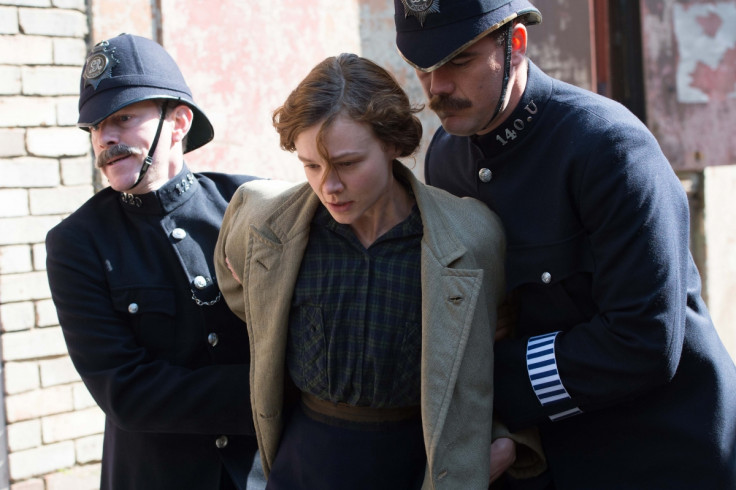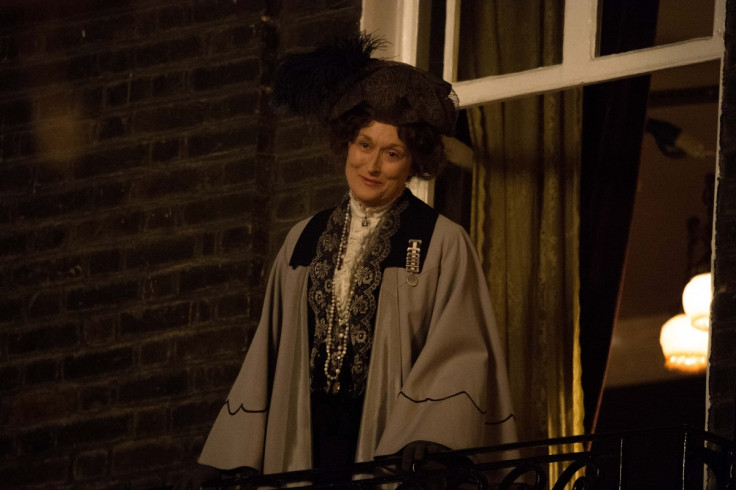Suffragette review: 'Be bold enough to protest' says Carey Mulligan

It was a scene straight out of the film Suffragette – only this time it was not scripted. Over a hundred feminist protesters stormed the barriers at the London premiere of Suffragette on 7 October. Women were physically carried and pushed back as green and purple smoke bombs were set off.
Activists from Sisters Uncut said they wanted to bring attention to the cuts to domestic violence services, declaring "the battle isn't over yet". It is an uncanny reminder of what happened in the early days of women's fight for the vote. Carey Mulligan, one the film's lead characters, said: "Hopefully this film will inspire everyone in the way they view the world. We are an unbalanced society – women and men – and films such as this inspire conversations about how we can correct that imbalance."
Women are angry. The peaceful protests of the suffragists have not worked, so the suffragettes take to acts of violence and civil disobedience. Suffragette, directed by Sarah Gavron is billed as the first feature film to tell the story of British women at the turn of the 20th century who risked everything in the fight for equality and the right to vote.
The opening scene takes place in the Glasshouse Laundry in Bethnal Green, east London. Great white sheets, steam billowing, working-class women doing backbreaking work. This is the story of one such woman's awakening, radicalised from non-political wife and mother, who vehemently claims not to be a suffragette, to being deep within the movement, taking part in meetings, imprisonment and the horrors of hunger strike and force feeding.
This is a tour de force performance from Mulligan as Maud Watts, as we follow her journey from laundry worker to firebrand. Maud has accepted the lot of the Victorian woman – low wages, long hours – but she is radicalised by another worker in the laundry, who is battered by her drunken husband although not beaten in spirit. There is plenty of action with bricks thrown through windows, police brutality and the blowing up of David Lloyd George's summer house. But the real emotion is played out on Maud's face, which fills the screen.
We see her transforming from unassuming Little Miss Mouse to a determined political agitator, proud to wear the violet and white colours of the Suffragette Movement. As Maud says in despair: "You've beaten us and betrayed us. There's nothing left."
The true horror of force feeding is played out in a particularly horrific scene, with a tube placed up Maud's nose. Many Suffragettes never recovered physically from the brutalities they suffered in prison, either dying from pneumonia or a particularly brutal force feeding.
In her speech to David Lloyd George, Maud describes her working life – starting work part time at the age of seven, the dangers of working in a laundry – the scaldings from boiling hot water (in evidence from the scars on her arms), her mother died from the effects of inhaling chemicals, the low pay – 13 shillings a week, compared to the men's salary of 19 shillings, plus working over a third longer hours.

If you previously despaired of the New Man, just think of what went before. A lot of unreconstructed males pepper the scenery. Abi Morgan's script is taut and lean, reminding us of the differences between men's and women's lives in the 19th century. When Maud asks her husband: "If we had a daughter, what would her life have been like?" her husband, played by Ben Whishaw, replies callously: "Just like yours." Instead of putting Maud in her place, this galvanises her into action, fighting for the rights of women to come.
As the police inspector, Brendan Gleeson is particularly loathsome, dismissing and ridiculing the suffragette as a woman with "three bricks in her bloomers" to lob at the department store windows of Oxford Street.
The cast is a roll call of strong female actors including Helena Bonham Carter, Romola Garai and Anne-Marie Duff. And, of course, there is Meryl Streep, who appears in just a few scenes as Suffragette figurehead Emmeline Pankhurst. It is a difficult role to play, with Streep decked out as the grande dame holding forth in a speech encouraging the large crowd of women, hanging on to her every word.
But there is not time or enough emotion conveyed in Streep's cameo to portray the charisma of Pankhurst who must have had an incredible force of personality to convince thousands of women to become pariahs in society, let alone risk personal injury and even a violent death. Having said that, Streep does come out with one of the best one-liners in political history: "I would rather be a rebel than a slave."
Suffragette is a timely reminder of how difficult the road to women's emancipation was – and still is. It is still a jolt that in Switzerland women received the vote astonishingly late – in 197,1 and that in Saudi Arabia, women get to vote for the first time in 2015.
© Copyright IBTimes 2025. All rights reserved.






















